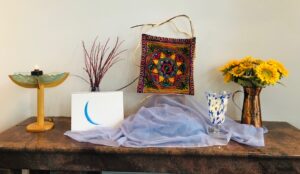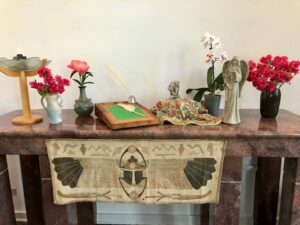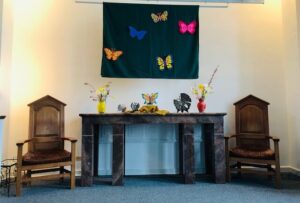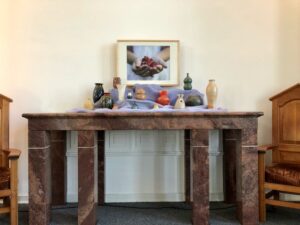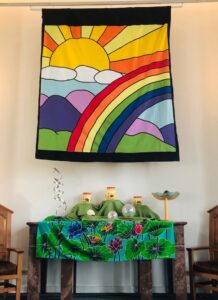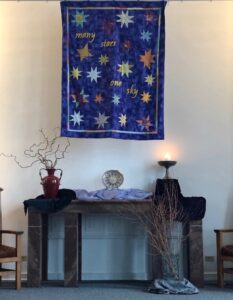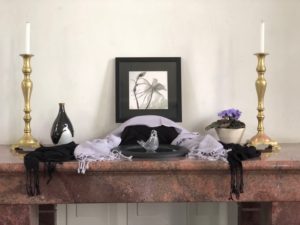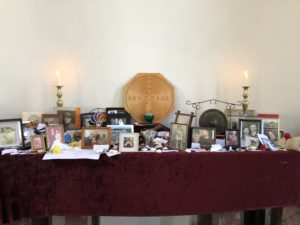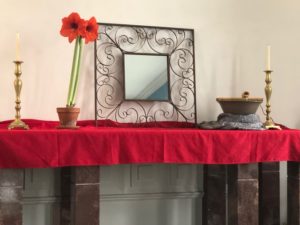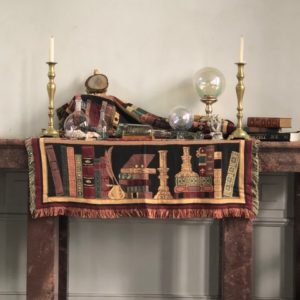“Free Together”
Rev. Tim Temerson
Unitarian Universalism values religious freedom – the freedom to question, to doubt, to grow, and to search for one’s own authentic spiritual truth and meaning. But rather than searching for truth alone, Unitarian Universalists live and celebrate their spiritual freedom in communities like the UU Congregation of Charlottesville. Today’s service will explore the importance of community in our spiritual lives and ask if we can truly be spiritual alone.
A family-friendly space to participate in worship is available in the social hall.
All are welcome!
ORDER OF SERVICE
Free Together”
Rev. Tim Temerson & Greg Abbott
Unitarian Universalist Congregation of Charlottesville
“Community is the native climate of the human spirit.” Howard Thurman
Prelude Offered by John Mayhood
Welcome Greg Townshend. Worship Weaver
Hayley Owens, Member of the UUCville Board
Call to Worship Words by Marta Flanagan
Opening HymnGuide My Feet
Chalice Lighting
Blessing For a New Year of Learning
Sharing the Flame
Hymn “As We Leave This Friendly Place”
Centering and Sharing
Offertory Offered by John Mayhood
Reading “The Task of the Religious Community” Mark Morrison-Read
Sermon “Free Together” Rev. Tim Temerson
Closing Hymn Come Sing A Song With Me Words by Carolyn McDade
Benediction and Chalice Extinguishing
Postlude & Recessional Offered by John Mayhood
Many thanks to this morning’s AV tech support from Rachel Buckland and for the welcoming from in-house ushers, greeters, and hospitality teams.
TEXT FROM REV. TIM’S SERMON BELOW: FREE TOGETHER
Among the many wonderful hymns we sing in Unitarian Universalism, one of my favorites has to be “Guide My Feet,” which was our opening hymn. I think what speaks to me about “Guide My Feet” is, on the one hand, its recognition that life can often feel like a race – a race in which we are moving at an overly fast pace and that too often feels like we are competing against one another. But as the hymn so powerfully reminds us, we are not running, we are not journeying, alone. We have helping hands and loving hearts supporting us, guiding us, loving us along the way.
Now, I don’t normally use racing or competition as a metaphor for our spiritual journeys. In fact, I’m usually telling you just the opposite – to slow down, to breathe, and not to live our already hectic lives at a faster pace. But I want to begin this morning by telling you a story about a famous race that I think points to something important about our humanity, about the search for truth and meaning, and about our hunger and our need to connect and belong to a community.
Let me begin with a question that probably only applies to those who were born before 1950. How many of you here in the sanctuary and on Zoom remember when the Four Minute Mile mile was first broken in 1954? Although I don’t remember it, the breaking of the four minute mile was a big deal in 1954 and something that middle distance runners had been trying to do for a very long time.
The race in which the four minute mile was broken took place on May 6, 1954, during an otherwise ordinary track meet in Oxford, England. At the meet, a young medical student by the name of Roger Bannister won the mile race that day in a time of 3 minutes 59.4 seconds.
By today’s men’s track and field standards, Bannister’s time was far from record-breaking. But in the spring of 1954, his four laps around that track made Roger Bannister the first person to break the four minute mile.
I first became acquainted with the story of the breaking of the four minute mile while I was in college back in the 1980s. Roger Bannister came to the college to serve as the keynote speaker at a conference the college was hosting – a conference that was timed to take place on the 30th anniversary of his record-breaking race. A number of other current and former athletes were in attendance and as Bannister was being introduced and the story of that historic day was being retold, something about it caught my attention. You see, in addition to recognizing Bannister’s individual achievement, special mention was made of the help he had received that day from two close friends and fellow runners, Chris Brasher and Chris Chattaway.
The two Chris’ (as they came to be known) had run the record breaking race that day with Bannister and had paced him through the first three laps so that he could maintain the speed needed to break the record. Chris Chattaway was also at the conference that day and as the audience rose to give Bannister a standing ovation at the end of his address, Chattaway stood beside his friend, accepting congratulations for a monumental achievement which had truly been a team effort.
I didn’t think much more about Roger Bannister or the breaking of the four minute mile until some years later when I read a wonderful book called The Perfect Mile written by Neil Bascomb.
It tells the story of Bannister and two other runners – John Landy and Wes Santee – all of whom were seeking to become the first person to break the four minute mile.
While competing on different continents and possessing very different running styles, the three men had one thing in common. Each pursued their dream of breaking the four minute mile alone. They trained alone, plotted strategy alone, made their attempts at the record alone. They preferred to pull themselves up by their own bootstraps (or in this case by their own track shoes) rather than relying on the support and teamwork of others.
Now to some extent, these solitary approaches worked. Bannister, Santee and Landy steadily improved their times, inching closer and closer to the sub-four minute mile. But as each man neared the historic barrier, they seemed to hit a wall. No matter how hard they trained or how often they tried, the three runners could not break four minutes. Some began to question if the four minute barrier would ever be broken.
Roger Bannister shared those doubts. He feared that his years of training and hard work were not enough and that he might never achieve his ultimate goal. Bannister’s journey was clearly at a crossroads. He realized that he had to change, to try something new. So he abandoned the lone ranger approach that dominated track and field of his day and reached out to others for help. He began to listen to and lean on the wisdom and support of his two friends and fellow runners, Chris Brasher and Chris Chattaway. Brasher and Chattaway became his companions, his training partners, his guides along the journey.
The decision to lean on others for support was the turning point in Roger Bannister’s quest to break the four minute mile. The results were almost immediate. His training improved as he grew physically stronger and faster. Bannister also benefited emotionally and even spiritually. His friends believed in him. Their confidence and their willingness to put their own time and energy into helping Bannister break the four minute mile reinvigorated his faith and confidence in himself.
May 6, 1954 is the historic day Roger Bannister ran the mile in 3 minutes 59.4 seconds. But the record was set long before he crossed the finish line that day, for it was at the moment Bannister realized that he could not make his journey alone that the four minute mile was truly broken.
By the way, as you may know from participating in or watching track and field today, the approach taken by Bannister, Brasher, and Chattaway has become the standard in middle distance running. If you watch an elite track and field event, you will almost always see a runner or two tasked with setting the pace for the field. These so called “rabbits” or “pace setters” are not in the race to win; rather, they are there, like Brasher and Chattaway, to help the other runners find a good pace so they won’t have to run their race in vain.
It’s interesting to note that after Bannister broke the seemingly impossible barrier of a sub-four minute mile, some critics or I guess you might call them purists criticized his team-oriented approach. Running is an individual pursuit and a solitary endeavor, these critics charged, and everyone should be in it for themselves and in it to win on their own.
Now, as you can probably tell, Roger Bannister’s story speaks to me. I admire his determination, his will to go on in the face of failure and self-doubt. But what inspires me most about Bannister’s extraordinary achievement was his willingness to ask for help, to lean on others, and to recognize that his solitary path wasn’t getting him anywhere. Bannister’s journey from being an isolated lone ranger to reaching out and leaning on others is, for me, a deeply spiritual story.
I say Bannister’s story is deeply spiritual because I believe his journey has something essential to teach us about our own spiritual journeys. In fact, I hear echoes of my own spiritual journey and of the journeys of so many Unitarian Universalists – journeys that take many of us away from the religious traditions of childhood or youth to seek truth and meaning on our own, outside of anything resembling a church or organized religion. But then, at some point, many find themselves yearning for something more, for some greater sense of community and connection, which leads us to join congregations like the UU Congregation of Charlottesville.
That basic journey certainly describes my spiritual life. Like many Unitarian Universalists, I would describe myself as a seeker and for all of my life I’ve been searching – searching for something deeper, for some truth or experience that will bring meaning and purpose to my life without forcing me to believe things that I cannot. In many ways, I’ve been reaching for what the great Jewish theologian Abraham Joshua Heschel called “radical amazement,” a sense of awe and wonder that comes from being deeply connected to something greater than myself and from feeling at home in the universe.
But like Roger Bannister’s journey to break the four minute mile, I spent many years seeking that radical amazement, that sense of belonging, alone and on my own. For years, I worked under the assumption that I was most likely to find what I was looking for by journeying away from community and from anything resembling organized religion. Far from being a source of wisdom or inspiration or belonging, I saw religion as a barrier to my search for truth and meaning. That’s why whenever someone asked me if I belonged to a church or considered myself to be religious, I always rather uncomfortably fell back on some version of that old familiar line, “I’m spiritual but not religious.”
But as time went on, I discovered one serious problem with being spiritual but not religious. For all of my talk about doing my own thing and not being ensnared by religion or creeds, I felt spiritually alone and isolated. Rather than finding truth or experiencing deep connection, my spiritual hunger remained unfulfilled. Roger Bannister kept hitting a physical wall when he tried to break the four minute mile on his own. I kept hitting a spiritual wall that left me adrift and with a feeling of emptiness and even loneliness.
After years of frustration and isolation, like Bannister, I abandoned my solitary journey and began reaching out. My family and I started attending a Unitarian Universalist congregation and I’ve got to tell you that on those first few Sundays I felt anxious and even a little scared. I hadn’t been in church in years and was unsure of what to expect. Surely I was going to encounter someone who would try to co-opt my journey by imposing their beliefs or doctrines on me. But, much to my surprise, that never happened. Instead, I have been welcomed and celebrated for who I am and invited to become part of a community rooted in unconditional love and acceptance.
And as I got more involved in Unitarian Universalism, something extraordinary happened to me. Those feelings of emptiness and isolation gave way to the warmth of love and mutual support. For the first time in my spiritual journey, I really began to understand that being in community and journeying with others were essential for my spiritual life. I began to really listen to others journeys and stories and found in them a source of truth and meaning that I had never known. And most importantly, joining a religious community and sharing my spiritual life with others gave me an overwhelming feeling of homecoming and belonging – of being part of a community, part of a tradition, part of a religious movement rooted in love, rather than judgment, acceptance rather than intolerance, justice rather than the status quo. And it was that feeling of belonging – of being connected to a community that loved, inspired, and transformed me – it was that feeling which broke down that spiritual wall I had hit and that enabled me to experience that sense of meaning, deep connection, and wholeness for which I had yearned for so many years.
And while I’m talking about those deep connections, let me put in a plug in for one that played a very powerful role in my journey. Today after the service, Cathay Polly will be at a table right outside the social hall if you would like to sigh up for a Covenant group. Covenant groups consist of 6-8 people who meet over the course of a year for spiritual conversation and community. Each session is centered around a particular spiritual topic and the goal of a covenant group is to listen and grow together, not to debate or come up with a final answer. I can say from personal experience that being part of a covenant group enriched my spiritual life in ways that I never thought possible. I really learned how to listen deeply, how to pay attention, and how to gain wisdom from the stories and insights of others. If you have questions about covenant groups or are interested in joining a group here at UUCville, please do stop by the table after service and talk to Cathy Polly.
Having once prided myself on being spiritual but not religious, I soon realized that I could only be spiritual – that I could best experience that deep connection, that radical amazement – when I am in the loving embrace of a UU religious community. So if someone were to ask me today that same question about being spiritual and going to church, I would now respond by saying that yes, I’m spiritual, but that I’m spiritual because I’m religious, because I’m a Unitarian Universalist, because my life has been enriched and transformed by the love, the wisdom, and the healing that lives in religious communities like the one I found so many years ago and like the one you are worshiping in this very morning.
Before closing, I want to return to those purists, those individualists who criticized Roger Bannister for reaching out and asking for help. You see, I think it’s fair to say we’ve had a somewhat similar approach to religion and spirituality in Unitarian Universalism. For much of our history, we UUs journeyed in the shadow of some of our most famous forebears – the Transcendentalists. Under the influence of Ralph Waldo Emerson, Henry David Thoreau, and others, we tended to embrace what I would call a rather individualistic approach to religious life. We affirmed (and still do affirm) the central importance of individual freedom, nonconformity, and spiritual self-reliance. We urged our members to find their own truth, to find their own way, and, to paraphrase Emerson, to trust primarily themselves as they made their spiritual journeys.
In recent decades, however, I think there has been a shift in Unitarian Universalism – a shift from spiritual individualism to spiritual community. Don’t get me wrong. We Unitarian Universalists still value individual freedom and authenticity. In fact, they are at the heart of who we are as people of faith. That is why we welcome and accept all people and invite them to come as they are rather than imposing a creed or dogma. But in contrast to Emerson and the Transcendentalists, we have come to recognize and celebrate the beauty and blessings of the shared journey, of the truth and wisdom that lives not just in me, but in each and every one of you. Thanks in part to programs like covenant groups, we have learned that those deep connections are made and come alive when we share our lives and listen to and love one another. We UUs have learned, quite simply, that freedom, at its best, is freedom together.
I simply want to conclude by inviting you to share your journey, your wisdom, your radical amazement with us. We need one another and as Mark Moorison-Read reminded us in our reading, the task of the religious community is to unveil the bonds which connect us. That connectedness is essential, it is part of who we are as human beings. I’m not sure what the equivalent of running the four minute mile is in our spiritual lives. Maybe spirituality is like a beautiful dance. You can, of course, dance alone and on your own and I have certainly witnessed many beautiful dances performed by a single dancer. But there is something wondrous, something almost magical about the shared dance when two or more people come together to create something beautiful and timeless. I have certainly been blessed by the dance of Unitarian Universalism – a dance in which we are welcomed and accepted and celebrated not not because of what we believe, what we look like, where we live, how much money we make, or who we love, but rather a dance that welcomes and accepts you simply because you’re you. I know that sounds simple but, when you think about it, given today’s religious climate, it’s pretty radical. That’s the journey we need to make, the race we need to run, and the dance we need to dance not only as a church, not only as people of faith, but as the whole human family. We are so glad you’re here and so glad we can love and support one another as we run this marvelous race and dance this wondrous dance together!

